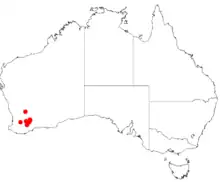| Hyden wattle | |
|---|---|
| Scientific classification | |
| Kingdom: | Plantae |
| Clade: | Tracheophytes |
| Clade: | Angiosperms |
| Clade: | Eudicots |
| Clade: | Rosids |
| Order: | Fabales |
| Family: | Fabaceae |
| Subfamily: | Caesalpinioideae |
| Clade: | Mimosoid clade |
| Genus: | Acacia |
| Species: | A. lanei |
| Binomial name | |
| Acacia lanei | |
 | |
| Acacia lanei occurrence data from Australasian Virtual Herbarium[1] | |
Acacia lanei, commonly known as Hyden wattle,[2] is a shrub of the genus Acacia and the subgenus Plurinerves that is endemic to south western Australia.
Description
The spreading shrub typically grows to a height of 1.5 to 2.3 metres (5 to 8 ft)[3] and has resin-ribbed branchelts that are covered in fine white silky hairs. Like most species of Acacia it has phyllodes rather than true leaves. The ascending evergreen phyllodes have a linear to linear-elliptic shape and are straight to slightly curved with a length of 4.5 to 6 cm (1.8 to 2.4 in) and a width of 3 to 5 mm (0.12 to 0.20 in) and have numerous subdistant nerves.[2] It blooms from July to September and produces yellow flowers.[3]
Distribution
It is native to an area in the Wheatbelt region of Western Australia where it is usually situated along creeks and drainage lines growing in gravelly loam, clay and clay-loamy soils.[3] It has a limited distribution to a small area around the town of Hyden where it is often a part of Eucalypt woodland communities and is often associated with Eucalyptus loxophleba or Eucalyptus salmonophloia. It has also been grown as a windbreak and is found to be unpalatable to livestock.[2]
See also
References
- ↑ "DOI Details". doi.ala.org.au. doi:10.26197/5c0b1388984eb. Retrieved 8 December 2018.
- 1 2 3 "Acacia lanei". World Wide Wattle. Western Australian Herbarium. Retrieved 1 December 2020.
- 1 2 3 "Acacia lanei". FloraBase. Western Australian Government Department of Biodiversity, Conservation and Attractions.
